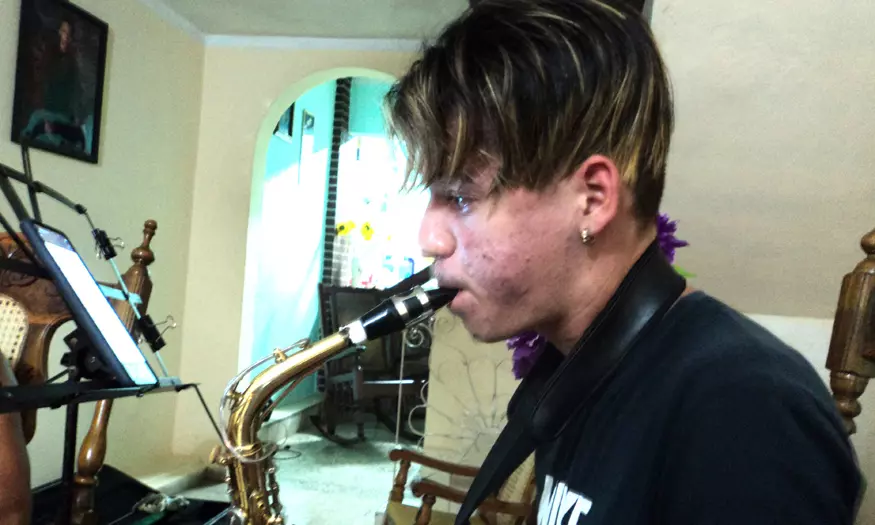When you walk along Martí Street that goes up to the square, in the house marked with the number 23 A, just where General Marrero Avenue begins, you can hear a varied report of different musical sounds coming from a Chinese trumpet, a drum or a cowbell; and … in recent times the repeated notes of a saxophone in a daily practice from a young music talent in Banes.
The exercises are performed by Carlos Alaín González Dorado, a 16-year-old young man who studies at the Juan George Soto Cuesta pre-university in the municipality of Banes, in the north of eastern Cuba, and who carries within himself an extraordinary musical talent which he strives to cultivate by devoting all his effort to it.
A deep interest and love for music is evident in this young man when you talk to him about it. His eyes shine brightly and he can hardly express the amount of ideas that flow into his mind when referring to his great passion.
Some merits endorse his interest in the profession by being director of the conga banense, playing in the Municipal Concert Band, while directing a popular music quartet and a duo, which reaffirms what we have just expressed about Carlos, a music talent of Banes.
His parents remember that at the age of three he showed a vocation for musical instruments and they bought him a small drum with which he entertained himself by playing it for long hours with an amazing rhythm for his young age.
When he was eight years old, he joined the Municipal Concert Band, supported by his teacher Israel, where he learned to read the first scores, theory and solfeggio.
The musicians of the town recommended the teenager to study wind instruments, and he decided to learn to play the corneta china, a key instrument of the carnival congas, until he mastered its sounds. This is how he decided to create a comparsa at his young age.
He studied solfeggio at the academy banense with the teacher Lescay but he had to give up because the classes coincided with his normal studies. He decided to take up the saxophone because it is a classical instrument, and the classes were given by Rafel Zaldívar, an expert teacher who taught him and he learned the different positions of the instrument. Now he plays it in the band as a student and as an instrumental soloist.
Carlos can be seen playing some of the musical instruments in the May Day parades, in the festivities organized in the territory such as the inauguration of the Almirante Hotel in Guardavaca, in the congas and in the presentations of the Municipal Concert Band as a professional.
Clarinet and saxophone are the instruments he likes the most, but he always chooses the latter. He feels satisfied because he has four teachers who guide his aspirations and allow him to learn solfège with Israel, harmony with Alberto and saxophone and piano with Rafael and Chachi respectively.
During the development of the Week of the Banense Culture, in the last years, he offers his contribution with his favorite instrument because he has a wide saxophone repertoire; and he is invited to play in Banes, Holguin and Santiago de Cuba when they carry out cultural days.
The conversation with this talented young man took place in the living room of his house on a cold night when rain was threatening. We were joined by his parents Carlos González and Mayelin Dorado and Luis, a close friend of the family, who enjoyed several interpretations that Alaín made with his saxophone demonstrating his skills with the instrument.
They feel proud and encourage him to follow the path of music knowing that he has put all the interest to master the instrument, because inside him there is a natural talent that he cultivates with love and interest.
By Alberto Santiesteban Leyva
- Cuba Reiterates Commitment to Population Protection Policies - 11 de July de 2025
- The Cristal Festival Returns to Holguin - 11 de July de 2025
- Parliament Publishes Corrected Versions of Bills - 11 de July de 2025

